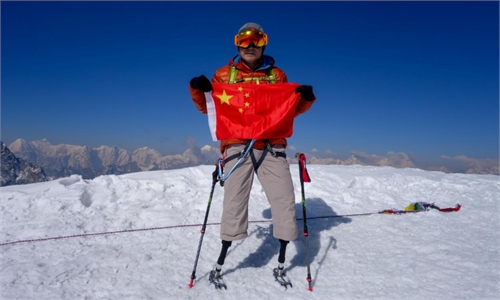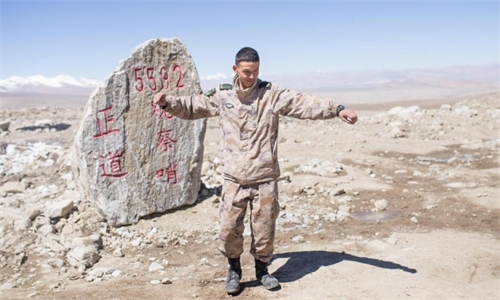IN-DEPTH / IN-DEPTH
Generation born in the 1980s inspired by the fastest-growing decade in China
Editor's Note:
Youth is the most active and vital force in society. The hopes of a country and the future of a nation lie in the hands of its younger generation.
Under different historic periods, the environment under which the Chinese youth have growing up, the events they have experienced, and the opportunities they were offered are also entirely different. However, what has never changed is that they have always played a vanguard role in the quest for national rejuvenation.
The State Council Information Office of China on April 21 published a white paper titled the "Youth of China in the New Era" on the occasion of the 100th anniversary of the founding of the Communist Youth League of China. "The Chinese Dream is a dream about history, the present, and the future. It is cherished by all of the people, but even more so by the young," it read.
In this vein, the Global Times recently interviewed Chinese people born in the 1950s, 1980s, and 2000s, who had varying experiences in their formative years, to illustrate the dream, the passion, and the beauty of different generations of Chinese young people.
This is the second installment.
The 1980s were an open, inclusive and passionate era in China. The passion, romance and idealism of the 1980s were epic and most millennials have never experienced this. They grew up in the 20 years when China's economy increasingly developed and became an influential power on the world stage.
Whether they are scientists or grassroots officials, the understanding of "beauty", "success" and the "Chinese dream" of the post-1980s generations cannot be isolated from the context of China's booming era. They reflect the exuberance of young people in China's soaring orbit.

The biomedical scientist Ma Yuting Photo: Courtesy of Ma Yuting
'I witnessed how China has grown from a backward player to a pioneer'
As a woman biomedical scientist born in 1984, Ma Yuting's understanding of "beauty" has been closely linked to science. She believes that beauty represents the rhythm of nature and the human body as well as a passionate collision between nature and subjective and objective concepts, just as in her discoveries made through her scientific research.
Ma, director of the Immunization Platform at the Suzhou Institute of Systems Medicine (SISM) under the Chinese Academy of Medical Sciences, has promoted studies on how stress modulates natural or therapy-induced immune surveillance against cancer. She won the 26th China Youth May Fourth Medal alongside 154 other young scientific and technological talents and groups who demonstrated remarkable zeal and commendable contributions.
Ma's research in tumor immunology has extended for over a decade and her focus is to decipher how multi-level stress responses modulate immune reactions, and find innovative approaches to help the immune system eliminate tumors. Her ongoing research also extends to the neuro-immune crosstalk in other immune-related diseases, such as viral infections and inflammation.
Her continuous endeavors hinged on these innovative concepts and led to over 50 highly-cited publications in prestigious global scientific journals, book chapters and granted patents. She has also received several scientific awards, including the Chinese Young Women Scientist Award (2019) and Chinese Young Scientist Award for Cancer Research (2020).
On her golden years, with passion and creativity, Ma is fully occupied thinking beyond the horizon to fill the gaps in knowledge with state-of-art experiments. Despite all the accolades, Ma still shows the down-to-earth and practical spirit of a scientist when talking about success and the ideal.
"Before devoting ourselves to medical scientific research, we must have a realistic attitude and always stay focused. During years and years of challenging work, we need to hone our skills, be perseverant and keep an open mind to produce outstanding and valuable breakthroughs," Ma said.
When she was a child, Ma preferred being praised as a "smart" kid rather than a "beautiful" girl. She told the Global Times that her primary school teachers used to say that she was "a girl with question marks all over the head" due to her strong curiosity. She also enjoyed getting her hands dirty to find answers to her questions. Research work can satisfy these urges, which she enjoys, to meet the beauty of scientific research.
Ma feels lucky to see the fruits of her research grow in tandem with China's national power and rapid economic development. "I arrived at Paris for my PhD in 2008 just after the end of the Beijing 2008 Olympic Games. I could already feel that China's rising power was gaining a foothold on the world stage and that provided a favorable environment for youngsters studying abroad. There was also a growing presence of Chinese scientists in immunology research," Ma told the Global Times.
At that time, her dream was to learn from world-class experts, be inspired with the latest advances in the field and return to China with more knowledge and skills. Ma established her own lab in Suzhou in 2015 and she was determined to combine her research interest with the country's major scientific programs.
Today, the unprecedented research findings of her team have attracted extensive attention overseas. "I have witnessed how China has grown from a relatively backward player with gaps in hardware and facilities to a pioneer who keeps pace with, and even leads, some scientific research areas. And I feel lucky and proud to be a Chinese scientist," Ma told the Global Times.
She noted that now is the golden age of tumor immunity research, and China needs to achieve high-level science and technology autonomy to avoid a technology bottleneck and the monopoly of overseas pharmaceutical manufacturers. "The China dream in the area of health will be realized with increasing investment in medical research funds, well-educated researchers and doctors, and cutting-edge hardware and facilities," said Ma.
Ma's team is quite young with most master or PhD candidates from the post-1990 generation and she remains optimistic about their promising future. "Cancer is terrible and life is precious. We have no choice but to face the challenges with courage, intelligence, and diligence. Step by step, we will be able to bring more therapeutic options and hope for cancer patients and their families. And that is the value of our lives," Ma remarked.

Wang Zhiqi (second right) and the villagers Photo: Courtesy of Wang
'Young people should go where the motherland needs them'
The generation of the 1980s is the backbone of various fields in society across China, including in the most grass-root positions at the remotest regions of the country.Wang Zhiqi, born in 1981 in Longnan, Northwest China's Gansu Province, has settled in Xinjiang Uygur Autonomous Region for almost two decades. In the past six years, he has devoted to work in local villages, leading residents to shake off poverty and become wealthier.
At the age of 18, Wang joined the air force and served in Handan, North China's Hebei Province. "At that time, I wanted to be close to Beijing. It was my dream.But during my service, I developed another dream, to go to Xinjiang," he said, adding that "young people should go where the motherland needs them."
"When we were young, my generation experienced major events such as the NATO bombing of the Chinese Embassy in Belgrade in 1999 and the SARS outbreak," Wang said.
"The sacrifice of pilot Wang Wei in 2001 especially affected me a lot. Even today, I would say that if the motherland needs me to defend it, I would."After he left the military he worked for SinoPec in Kuqa, in the Aksu region of Xinjiang. "Twenty years ago, where I worked was so bleak and desolate," he said, "but I encouraged myself to carry on and I stayed."
In 2017, Wang answered the call to work as a deputy head of the work teams stationed in villages, helping the residents reduce poverty."It was very difficult at the beginning. The villagers did not want to make any effort to improve their livelihood," Wang told the Global Times, noting that "we helped them to change their minds and now all the working-age residents have found a job. The village has become cleaner and more beautiful and the income of the residents increased greatly."
To Wang, the beauty in his mind is the magnificent scenery of Xinjiang, the happy smiles and dances of the residents of the village, as well as their good life.In Wang's opinion, those Chinese who were born in the 1980s bear the sense of responsibility and duty and are always willing to offer themselves voluntarily.According to him, more than half of the cadres currently stationed in villages in Xinjiang were born after the 1980s, as well as government leaders in county level. They work hard for the prosperity and stability of Xinjiang.
As of the end of 2020, 255,000 resident teams and more than 3 million officials had been dispatched to poor villages as first secretaries and resident officials, fighting on the front line against poverty, according to the White Paper: Poverty Alleviation: China's Experience and Contribution.Over the past 40 years, China has lifted nearly 800 million people out of poverty, accounting for more than 75 percent of the world's poor.




